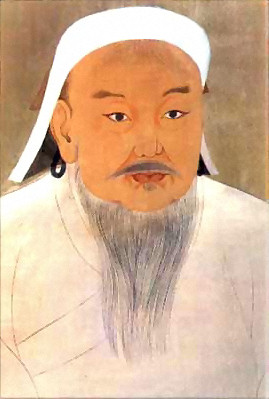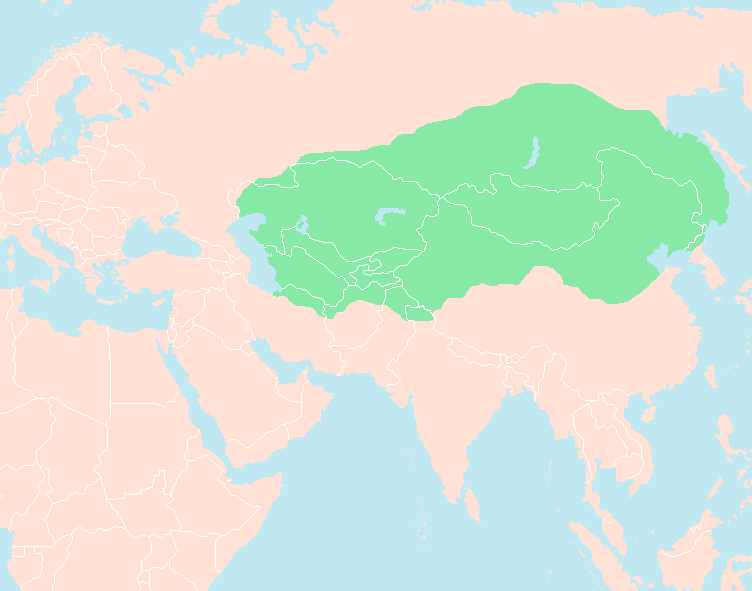 |
| Genghis didn't allow paintings or drawings of himself, so the depictions of him were done after his death. Personally, I like to believe he looked a lot cooler than this. |
Genghis Khan's name was Temujin, finding his title he will be better known for much later in his life. He was born into at the time what was a typical Mongolian story - he was part of a nomadic tribe constantly warring with other tribes (although by that I mean mostly just hit and run attacks that steal some women and goods). Friends with another tribe, he was set to marry Borte, a childhood friend of his who would stick with him the rest of his life. He was also the son of the chieftain, an important position but one that would cause great turmoil in his life. His father died at an early age, leaving Temujin to take over his role - unfortunately, this happened pretty early in his life. His tribe could hold no respect or take orders from someone as young as he was, and he and his mother, along with his older siblings, were banished. Now, banishment is pretty rough back in the day. His mother was forced to feed off berries and rats and whatever she could forage for her and her kin. She had no tribe to fall back on, no support, and living in constant fear of some tribe deciding that this banished woman would be useful target practice. Nevertheless, she persevered and kept the family running. However, Temujin wasn't overly fond of the family dynamic. Older siblings in Mongolian culture basically run the show of the younger ones; if he says jump, they jump. Unfortunately for his older brother, he did not know he was dealing with what would one day be someone considered kind of a big (and terrifying) deal. Temujin murdered his brother, presumedly making for a very awkward family brunch the next morning.
 |
| That's better. He looks way cooler now. |
He then participated in what was typical Mongolian life at the time - raiding enemy tribes, stealing items and taking their possessions, both goods and women. It was basically an endless system - they would rarely fight and the men would typically just flee on horseback, and eventually the attacked tribe would counterattack and break somewhat even. It was endless; no one really grew to be any great power, and life was stagnant. Temujin didn't approve of this system and sought to change it for the better. Instead of killing enemy tribes, he integrated them. He would take orphans from tribes he defeated as his sons, and would show some degree of mercy towards them, offering them to join under his rule. He would give position to men based not on family ties or by which tribe they were born into but instead through merit and loyalty. His family traditionally did not receive the best treatment, but instead were regular people in his forces with maybe a slight nod to the bloodline now and then. Through integrating with the tribes, he began to grow in power.
Jamukha (if you're too lazy to scroll up, this was his childhood buddy) became displeased with his newfound power and method of ruling. He and Temujin fought a number of small skirmishes and outright wars between them, with Temujin eventually coming out on top. In an early showing of his cunning military strategy, he would sometimes have his men create multiple fires when setting up camp in sight of the enemy, making them believe they had many more men than they actually did. This caused some men to defect to their side, bolstering their forces while weakening the enemy. After defeating Jamukha, he offered peace between them, saying there was still a kinship between them. Jamukha agreed, but said that there was only to be one ruler, and he then could not live as it would be disruptive to that rule. Temujin, with heavy heart, killed Jamukha.
 |
| Just look at how much he took over. This is his territory at the time of his death. It makes Hitler and the Roman Empire both look like chumps. |
With a force of well trained horsemen at his side, he set his sights to the south and southwest of his territory, a number of cities along the silk road that had numerous luxury goods that Mongolia simply did not have. These cities, however, posed a new, previously unseen problem for the Mongol horde. Walls. The Mongols were not really big on buildings, being a nomadic people, and were completely new to siege warfare. Regardless, Temujin (now given the title of Genghis Khan, basically meaning 'strong ruler') quickly adapted to the new challenge. For one city, he actually diverted the river to flood the city and its inhabitants. For another, he began to build and utilize siege weapons he had discovered from previous attacks. During one assault, he used the brilliant tactic of feigning a hasty retreat leaving a number of the supplies and goods of the Mongols behind. The city guards then went to take the spoils, but were surprise attacked by flanking Mongol horsemen who eagerly ran into the newly opened city walls. He was proving to be an unstoppable, brilliant tactician.
Traditionally, Genghis would enter a city and slaughter the soldiers that stood against him, along with members of the aristocracies that he believed may attempt to rise up against him. The ones he would keep, however, were the men and women who provided some variety of useful service - scholars, engineers, miners and the like that the Mongols had few of. They were integrated into the culture and treated as equals. His raids were wildly successful and his losses very low. There were proving to be few that could stand in his way.
 |
| He's on their $1000 bill. Or whatever they call dollars there. I'm not really sure. Either way, it's a big number and his face is on it. |
Next up on the chopping block was Russia, a country he sent 20,000 soldiers led by two trusted generals to take. They sent word to a number of Russian princes who knew little of the Mongolian prowess in warfare. The European armies, along with Russia, mostly were composed of foot soldiers and knights that were loaded up in heavy armour. Once again, the Mongols used the retreating tactics and mobility to lure the Russians towards them. Thinking they had them defeated, the Russians chased the Mongols. Genghis Khan allowed them to close but never within striking distance. The fastest Russians were soon separated, and once the forces were spread, the Mongols let loose with a volley of arrows that had greater range than the European bows. On foot and lower in numbers, with their cavalry now exhausted from the horses carrying the heavy armour, they were forced into retreat - running headlong into the advancing, slower forces from before, causing tremendous confusion. Hardly any Mongolians were killed and the Russians were absolutely destroyed, hunted down easily one by one.
Sometime after, Genghis Khan attempted to lay down the law in regards to succession to his throne. By now, he was exceptionally old. This was an issue that was put off for quite some time, as the Mongols, oddly enough, didn't really like to chat about death. Naming an heir to the throne meant the death of the ruler, and that discussion was somewhat taboo. He attempted to set up which of his sons would take his role, but there was intense disagreement within his family and ultimately the cause of the end of the Mongolian empire. They just couldn't last without him. Nowadays, he's an absolute hero for his incredible reign in Mongolia and the numerous outlying areas he took over with ease.
He had a Khan do attitude.
Famous Historical Figures Say the Darndest Things!
- "I am the punishment of God... If you had not committed great sins, God would not have sent a punishment like me upon you." Genghis Khan was actually really big on religious freedom. His homeland was filled with Christians, Muslims and others. When raiding some of the European countries, he was seen as a punishment for the sins they had committed.
- "The greatest happiness is to scatter your enemy, to drive him before you, to see his cities reduced to ashes, to see those who love him shrouded in tears, and to gather into your bosom his wives and daughters." I like this quote because he most likely didn't say it. It was attributed to him long after his death, and goes to show just how varied the interpretations on his rule were (and are).
No comments:
Post a Comment